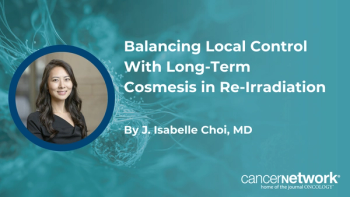
Abemaciclib Improves Response, PFS in Endocrine-Resistant Breast Cancer
Abemaciclib plus fulvestrant was linked with improved response and PFS in patients with endocrine-resistant, HR-positive, HER2-negative metastatic breast cancer.
CHICAGO-Adding abemaciclib to fulvestrant was associated with an improved objective response rate (ORR) and a 7-month improvement in progression-free survival (PFS) compared with placebo among patients with endocrine-resistant, HR-positive, HER2-negative metastatic breast cancer, according to findings from the multicenter, double-blind, randomized, phase III MONARCH 2 trial (abstract
Abemaciclib with fulvestrant was “an effective treatment for women with HR-positive, HER2-negative advanced breast cancer who progressed on endocrine therapy,” reported lead study author George W. Sledge, Jr, MD, of the Stanford University School of Medicine in Stanford, California.
Abemaciclib is an oral selective cyclin-dependent kinase (CDK)4 and CDK6 inhibitor that has received US Food and Drug Administration Breakthrough Therapy Designation for refractory metastatic breast cancer based on phase I monotherapy trial findings. CDK4&6 inhibition leads to reversible tumor cell G1 arrest. Continuous CDK4&6 inhibition causes sustained tumor cell cycle arrest, potentially triggering apoptosis.
The study authors randomly assigned 669 study participants 2:1 to receive fulvestrant plus either placebo (n = 223) or abemaciclib (150 mg twice daily or 200 mg twice daily prior to study amendment; n = 446). Premenopausal and perimenopausal women were administered a gonadotropin-releasing hormone agonist.
At a follow-up of 19.5 months, median PFS was 16.4 months for patients in the abemaciclib group and 9.3 months for the placebo group (hazard ratio [HR], 0.553; 95% CI, 0.449–0.681; P < .0000001).
“In patients with measurable disease, the ORR was 48.1% (3.5% complete response) for abemaciclib plus fulvestrant and 21.3% (0% complete response) for placebo plus fulvestrant,” Sledge said.
Treatment-emergent adverse events for abemaciclib plus fulvestrant were near universal and included diarrhea (86% vs 25% for the placebo group), neutropenia (46% vs 4%), nausea (45.1% vs 22.9%), and fatigue (39.9% vs 26.9%). The grade 3/4 neutropenia rate was 26.5% on abemaciclib, Sledge noted. “Diarrhea typically occurred early and was readily managed with dose adjustment and antidiarrheal medication.”
Based on the findings, abemaciclib and endocrine therapy will be studied as an adjuvant therapy for women with high-risk HR-positive, HER2-negative breast cancer in the monarchE study, which will begin recruiting patients late this year.
Newsletter
Stay up to date on recent advances in the multidisciplinary approach to cancer.











































